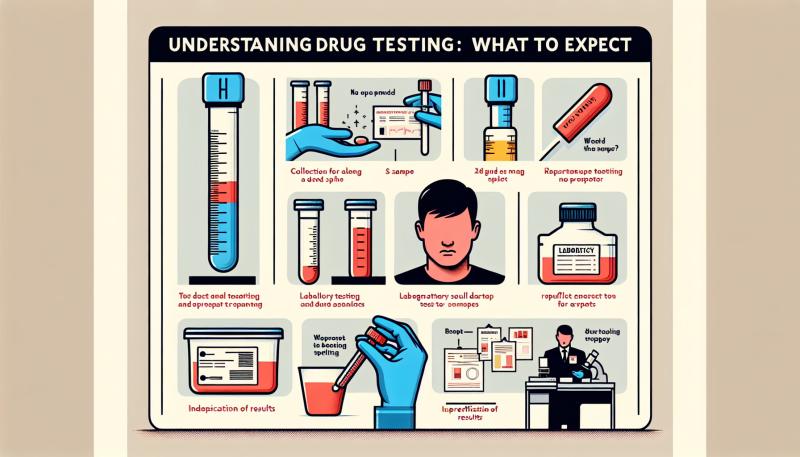
Understanding Drug Testing: What to Expect
In today's society, drug testing has become a commonplace practice in various sectors including the workplace, legal scenarios, and educational institutions. Understanding drug testing, what it entails, and what you can expect can alleviate anxiety and help you prepare adequately. Whether required for employment, legal compliance, or personal reasons, effective knowledge of drug tests can guide you through the process smoothly and without fuss. In this article, we delve into the intricacies of drug testing, providing you with a comprehensive overview tailored to individual consumers.
What is Drug Testing?
Drug testing is a technical examination of the human biological system to detect the presence of illegal drugs or prescribed medication. These tests can involve analysis of various biological specimens including urine, blood, hair, saliva, or sweat. Drug tests are often utilized by employers, legal authorities, and healthcare providers to ensure safety, maintain productivity, and comply with regulations.
Types of Drug Tests
- Urine Test: This is the most common type of drug test due to its non-invasive nature and cost-effectiveness. It detects drug metabolites— the byproducts formed after the body metabolizes a drug. Urine tests can identify a wide range of substances including marijuana, cocaine, opiates, amphetamines, and benzodiazepines.
- Blood Test: Considered the most accurate method, blood tests are less commonly used due to their invasive nature and high cost. They can detect the actual drug presence in the system, not just the metabolites, providing a more accurate window into recent usage.
- Hair Test: Hair follicle tests offer a longer detection window, capable of uncovering drug use over the past 90 days. This method is harder to tamper with and can detect chronic drug use. However, they are less effective at revealing recent drug intake.
- Saliva Test: Also known as an oral fluid test, this method is quick and less intrusive, making it suitable for on-site testing. It is effective at determining recent drug intake, within the past 24 to 48 hours.
- Sweat Test: Used less frequently, sweat testing involves placing a patch on the skin for an extended period (1-2 weeks) to collect sweat, which is then analyzed for substances. It is useful for continuous monitoring rather than a one-time screening.
The Drug Testing Process
The drug testing procedure usually follows several key steps to ensure accuracy and compliance with relevant laws and regulations.
- Sample Collection: Depending on the test type, a biological sample is collected. In urine tests, for example, this step may occur in a specialized collection area to minimize adulteration risks.
- Chain of Custody: To maintain the integrity of the sample, a transparent chain of custody process is implemented. This involves documenting all interactions and transfers of the sample from collection to testing.
- Laboratory Testing: The sample is sent to a laboratory where advanced testing technologies, such as gas chromatography-mass spectrometry (GC-MS), are used to accurately identify any drugs present in the specimen.
- Result Analysis: Results are analyzed by certified professionals to ensure they meet accuracy standards. Confirmatory testing may be performed for preliminary positive results to solidify findings.
- Reporting: Verified results are shared with the authorized requesting party, ensuring confidentiality and compliance with privacy laws.
Reasons for Drug Testing
- Employment: Many employers conduct drug tests during the hiring process or as part of a random testing program to ensure workplace safety and productivity.
- Legal Compliance: Drug tests might be court-mandated for individuals involved in legal cases, especially those related to custody or DUI charges.
- Rehabilitation Programs: Regular testing can be a part of monitoring and supporting recovery from substance use disorders.
- Sports and Athletics: Athletes may undergo drug testing to maintain fair play by detecting performance-enhancing drugs or substance abuse.
- School and Extracurricular Activities: Some educational institutions may implement testing to deter drug use and promote a healthy environment.
What to Expect During a Drug Test
Understanding what to expect during a drug test can significantly ease any apprehension you might have. Here’s a brief on what the process might involve, especially for a urine drug test:
- Preparation: Some tests may require you to abstain from food and drink for a certain period before, to prevent potential contamination.
- Sample Provision: In the case of a urine test, you will usually be asked to provide a midstream sample in a secure and private setting.
- Documentation: You may need to provide identification to confirm your identity and complete paperwork outlining consent and procedure understanding.
- Time Consideration: While the sample collection is instant, full analysis and result reporting might take several days, especially if confirmatory tests are needed.
Regardless of the purpose, drug testing can have significant implications on your professional and personal life. Understanding the intricacies of the process ensures you are well-prepared and informed. IMS Screening Solutions offers professional, compliant drug testing solutions that assure reliability and confidentiality, supporting your needs for accurate testing and peace of mind.
Conclusion
Navigating the world of drug testing doesn’t have to be daunting. By knowing what types of tests exist, understanding the processes behind them, and being prepared for what to expect, you can approach drug testing with confidence. Whether for employment, legal compliance, or safety reasons, trusted facilities like IMS Screening Solutions are available to provide expert and confidential testing services, ensuring minimal stress and maximum transparency. As you engage with these processes, prioritize informed decisions, and rely on reputable providers for the most dependable outcomes.
